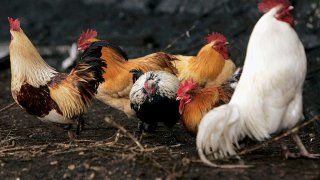
Massachusetts lawmakers gaveled out for the weekend without a deal to update the law governing treatment of hens and pigs that produce eggs and pork, and Attorney General Maura Healey is poised to enforce the new law in just more than two weeks if legislative compromise remains out of reach.
A six-member conference committee still has not reached an agreement since being tasked in October with resolving differences in the House and Senate bills to make changes to a 2016 voter law, and talks did not produce an accord before both branches adjourned Thursday.
The soonest that the Legislature will be able to send a bill to Gov. Charlie Baker is Monday, 12 days before the scheduled start of new limits on animal enclosures that industry leaders say could make eggs and pork products exceedingly hard to find because they would be non-compliant.
With some shoppers already stockpiling eggs and bacon, Baker said Thursday that he has spoken to House Speaker Ronald Mariano and Senate President Karen Spilka to stress the urgency of the issue.
Get Boston local news, weather forecasts, lifestyle and entertainment stories to your inbox. Sign up for NBC Boston’s newsletters.
Get updates on what's happening in Boston to your inbox. Sign up for our News Headlines newsletter.
"The estimates that are out there is that first of all, for most people, you just won't be able to access eggs at all and if you can, it's anticipated the price point on those will be up 40 percent or more," Baker told reporters after a State House event. "That just won't be an issue for people in the stores, that'll be an issue for restaurants and for other food establishments. If you think about how hard life has been for everybody who pays their bills based on their work in restaurants, I think the last thing we should do is make it even more complicated for them."
Healey's office published final regulations on Oct. 1 outlining enforcement of the animal welfare standards law that voters approved in 2016. Confining an animal in a cruel manner in violation of the new standards carries a $1,000 fine per violation, as does selling any shell egg, whole veal meat or whole pork meat produced by an animal held cruelly.
Local
In-depth news coverage of the Greater Boston Area.
The law is scheduled to effect Jan. 1, 2022, but if Beacon Hill fails to complete a fix by then, restaurants and stores will not immediately need to pull products from their menus and shelves on that day to comply.
Healey's regulations include a grace period that will effectively allow any product in the chain of production before Jan. 1 to be sold after that date. Businesses would be unable to roll out newly produced eggs, veal and pork from animals that are cruelly confined under the voter-approved law.
By putting regulations on the books, Healey's office has signaled it is ready to begin enforcing the voter law even though the designated enforcement agency might change under the pending bills.
In a December 2019 letter to lawmakers, First Assistant Attorney General Mary Strother said the AG is "not the best suited government office to lead the regulatory effort" and asked the Legislature to instead task the Massachusetts Department of Agricultural Resources with crafting regulations.
The Humane Farming Association sued Healey in January, alleging that she disregarded her legal obligation in the voter-approved law to promulgate the new regulations by Jan. 1, 2020.
Healey's office said the AG initially waited to begin drafting regulations because of the chance that lawmakers could update the statute amid changes in the industry. A spokesperson said the attorney general and HFA eventually agreed to stay the group's complaint pending completion of the regulatory process.
The Legislature never acted on her request last session, which also gestured at ongoing shifts in the industry now driving concerns about an imminent shortage in eggs and pork products.
Both versions of the legislation now in play would shift responsibility to MDAR. The House bill declares that MDAR "shall enforce the provisions of this act and may refer violations of this act for enforcement to the attorney general," and the Senate bill says MDAR "shall, with the advice and consent of the attorney general, promulgate rules and regulations for the implementation of this act concerning the respective authority of the department and attorney general."
Healey continues to support moving regulatory authority to MDAR and the broader push to update Massachusetts animal welfare standards reflected in the pending legislation.
"Uniform standards are already in place in other states and, in reliance upon them, producers have already made significant changes to the way they house and raise their livestock," she wrote to lawmakers in May, adding that concerns raised about the state's impending law "are valid, but can only be addressed through legislation, not regulation."
Under the Massachusetts voter law, pigs cannot be held in enclosures that prevent them from lying down, standing up, fully extending their limbs or turning around freely, and egg-laying hens must be given at least 1.5 square feet of floor space per bird.
Since voters took to the polls to endorse those limits, the egg industry and animal rights advocates have coalesced around the use of aviary systems that stack birds vertically, which allow for more humane treatment and use a smaller footprint.
Industry leaders warn that because of that shift, very few egg producers would be in compliance if the law kicks in without amendment to reduce the minimum amount of space per bird. New England Brown Egg Council President Bill Bell estimated "over 90 percent" of the eggs sold in Massachusetts would not be legal for sale under the law that's about to take effect.
The Senate in June approved legislation reducing the space standards to one square foot of space per bird in aviaries that allow vertical movement, and the House approved a similar version in October.
Lawmakers have been unable to agree, however, on whether to include House-backed language delaying the start date of a ban on the sale of pork meat from cruelly confined animals, from Jan. 1, 2022 to Jan. 1, 2023.
Rep. Carolyn Dykema, a Holliston Democrat who co-chairs the conference committee, said during House debate that fewer than 4 percent of pork suppliers are in compliance, threatening to upend supply of products to restaurants and stores.
Dykema's fellow House conferees are Democrat Rep. Dan Cahill of Lynn and Republican Rep. Norman Orrall of Lakeville. Sen. Jason Lewis, a Winchester Democrat, is the Senate's top negotiator alongside Democrat Sen. Becca Rausch of Needham and Senate Minority Leader Bruce Tarr.
Baker said he remains hopeful that lawmakers can overcome their differences and send him a compromise by the end of December to avert upheaval.
"Both the speaker and the Senate President told me they get the fact that this is an important issue and one that they need to resolve," he said. "I'm hoping and anticipating that I'll be signing legislation on this by the end of the year."



